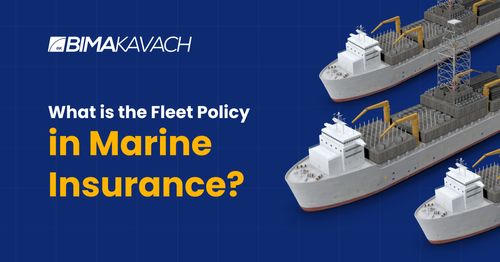Marine insurance is a vital component of global trade and shipping industries, providing financial protection against the plethora of risks that vessels and cargo face during transit. One essential concept within this domain is the fleet policy. A fleet policy is a specialized insurance arrangement designed to safeguard multiple vessels or a fleet of ships under a single, comprehensive coverage. In this article, we will explore the key aspects of fleet policies in marine insurance, their significance, and how they contribute to the protection of maritime assets in an ever-changing and unpredictable industry.
Understanding Fleet Policy in Marine Insurance
Marine insurance is a type of insurance that provides coverage for ships, cargo, and other marine-related risks. It is designed to protect ship owners, cargo owners, and other parties involved in marine transportation from financial losses due to accidents, theft, and other unforeseen events. One important aspect of marine insurance is the fleet policy. This is a type of policy that provides coverage for multiple vessels owned by the same company or individual. Fleet policies can be more cost-effective than insuring each vessel individually, and they can also provide more comprehensive coverage. The policy provides coverage for physical damage to the vessels, liability for third-party damage or injury, and protection and indemnity (P&I) coverage.
Fleet policies are customizable and can be tailored to meet the specific needs of a business. The policy can be adjusted to include or exclude certain types of coverage, depending on the requirements of the business. For example, a fleet policy may include coverage for crew members, pollution liability, and other risks that are unique to the marine industry. The terms and conditions of a fleet policy can vary depending on the size and type of the fleet, as well as the specific risks involved.
Get Free Quote in Minutes
Key Features of Fleet Policy
Certain key features of a fleet policy are discussed in brief below-
Coverage Scope
Fleet policies typically offer a wide range of coverage options, including protection against damage to the vessel, liability for damage caused to other vessels or property, and coverage for personal injury claims. Some policies may also offer coverage for pollution-related incidents, cargo loss or damage, and other risks that are unique to the marine industry.
Policy Terms
The terms of a fleet policy can vary depending on the specific needs of the insured party. Some policies may offer coverage for a specific period, while others may be renewed annually. The policy may also include a deductible, which is the amount that the insured party is responsible for paying out of pocket before the insurance coverage kicks in.
Other features
In addition to the coverage options and policy terms, there are a few other key features of fleet policies that are worth noting. For example, many policies are designed to be flexible, allowing the insured party to add or remove vessels from the policy as needed. This can be particularly useful for companies that are constantly adding or retiring vessels from their fleet.
Benefits of Fleet Policy
Fleet policy offers several benefits to businesses that own or operate multiple vessels. Some of the significant benefits are:
- Cost savings: A fleet policy is generally less expensive than insuring each vessel individually. The policy offers a cost-effective solution to businesses that own or operate multiple vessels.
- Simplified administration: A fleet policy simplifies the administration of insurance coverage. The policy covers all vessels under a single policy, reducing the administrative burden of managing multiple policies.
- Consistent coverage: A fleet policy provides consistent coverage across all vessels covered under the policy. The policy ensures that all vessels have the same level of coverage, reducing the risk of gaps in coverage.
- Flexibility: A fleet policy is flexible and can be customized to meet the specific needs of a business. The policy can be adjusted to include or exclude certain types of coverage, depending on the requirements of the business.

How to Choose a Fleet Policy
When it comes to choosing a fleet policy for marine insurance, there are several factors to consider before deciding. This section discusses some important factors to consider and provides tips on how to compare and select the best fleet policy.
Factors to Consider
Before choosing a fleet policy, it is important to consider the following factors:
- Size of the Fleet: The size of the fleet is a crucial factor in determining the type of fleet policy required. A larger fleet may require a different policy than a smaller fleet.
- Type of Vessels: The type of vessels in the fleet also affects the policy requirements. Different types of vessels may require different types of coverage.
- Operating Areas: The operating areas of the fleet can also affect the policy requirements. If the fleet operates in international waters, for example, the policy may need to provide coverage for a wider range of risks.
- Risk Profile: The risk profile of the fleet is an important factor in determining the type of coverage required. A fleet that operates in hazardous areas may require a different policy than a fleet that operates in calm waters.
Comparison and Selection
Once the above factors have been considered, it is important to compare and select the best fleet policy. Here are some tips to help with the process:
- Compare Policies: It is important to compare policies from different insurance providers to find the one that best meets the needs of the fleet.
- Check Coverage Limits: Check the coverage limits of each policy to ensure that they provide adequate coverage for the fleet.
- Review Exclusions: Review the exclusions of each policy to ensure that they do not exclude coverage for important risks.
- Consider Premiums: Consider the premiums of each policy and ensure that they are affordable and provide value for money.
- Check the Reputation of the Insurance Provider: Check the reputation of the insurance provider to ensure that they are reliable and have a good track record of paying claims.
By taking the above steps and considering the important factors, fleet owners can choose the best fleet policy that provides adequate coverage and meets their needs.
Claims Process in Fleet Policy
Filing a Claim
When a loss occurs, the policyholder must file a claim with the insurance company. In the case of fleet policy in marine insurance, the claims process can be complex due to the number of vessels involved. The policyholder must provide detailed information about the loss, including the date, time, location, and cause of the loss. They must also provide information about the vessel, such as its name, registration number, and type.
The policyholder should also provide any evidence they have to support their claim, such as photographs, witness statements, and repair estimates. The insurance company will investigate the claim and may send a surveyor to assess the damage to the vessel. The surveyor will provide a report to the insurance company, which will use it to determine the validity of the claim.
Settlement Process
Once the insurance company has determined that the claim is valid, they will begin the settlement process. The settlement amount will depend on the terms of the policy and the extent of the damage. The policyholder may be required to pay a deductible before the insurance company will pay out the claim.
The insurance company may choose to repair the vessel or pay the policyholder the value of the vessel at the time of the loss. If the vessel is repaired, the insurance company will work with the policyholder to find an appropriate repair facility. The policyholder may be required to obtain multiple repair estimates before the insurance company will approve the repairs.
If the vessel is deemed a total loss, the insurance company will pay the policyholder the value of the vessel at the time of the loss. The policyholder may be required to provide documentation to support the value of the vessel, such as a recent appraisal or sales receipt.
Overall, the claims process in fleet policy in marine insurance can be complex, but with the right documentation and information, policyholders can ensure that their claims are processed quickly and fairly.
Frequently Asked Questions
- How does a time policy work in marine insurance?
Under a time, policy, the insurer agrees to cover the insured vessel for a specified period, usually a year. The premium is calculated based on the value of the vessel and the risks involved. The policy covers all voyages undertaken by the vessel during the policy period.
2. What is the coverage provided by a single vessel policy in marine insurance?
A single-vessel policy provides coverage for a specific vessel for a single voyage. The policy covers the vessel against loss or damage caused by various perils such as fire, explosion, collision, and piracy.
3. What is an unvalued policy in marine insurance and how does it differ from a valued policy?
An unvalued policy is a policy where the value of the insured vessel is not agreed upon at the time of taking the policy. In contrast, a valued policy is a policy where the value of the vessel is agreed upon between the insurer and the insured at the time of taking the policy. In the case of a loss, the amount payable under an unvalued policy is determined by the actual value of the vessel at the time of loss, while in the case of a valued policy, the amount payable is the agreed value.
4. What is the significance of a port risk policy in marine insurance?
A port risk policy provides coverage for a vessel while it is in port and not in transit. The policy covers the vessel against loss or damage caused by various perils such as fire, explosion, and theft.
5. Can you explain the difference between a named policy and an open policy in marine insurance?
A named policy is a policy that covers a specific vessel or cargo. In contrast, an open policy is a policy that covers any vessel or cargo that the insured may own or acquire during the policy period. An open policy is usually taken by businesses that engage in regular shipping activities.

